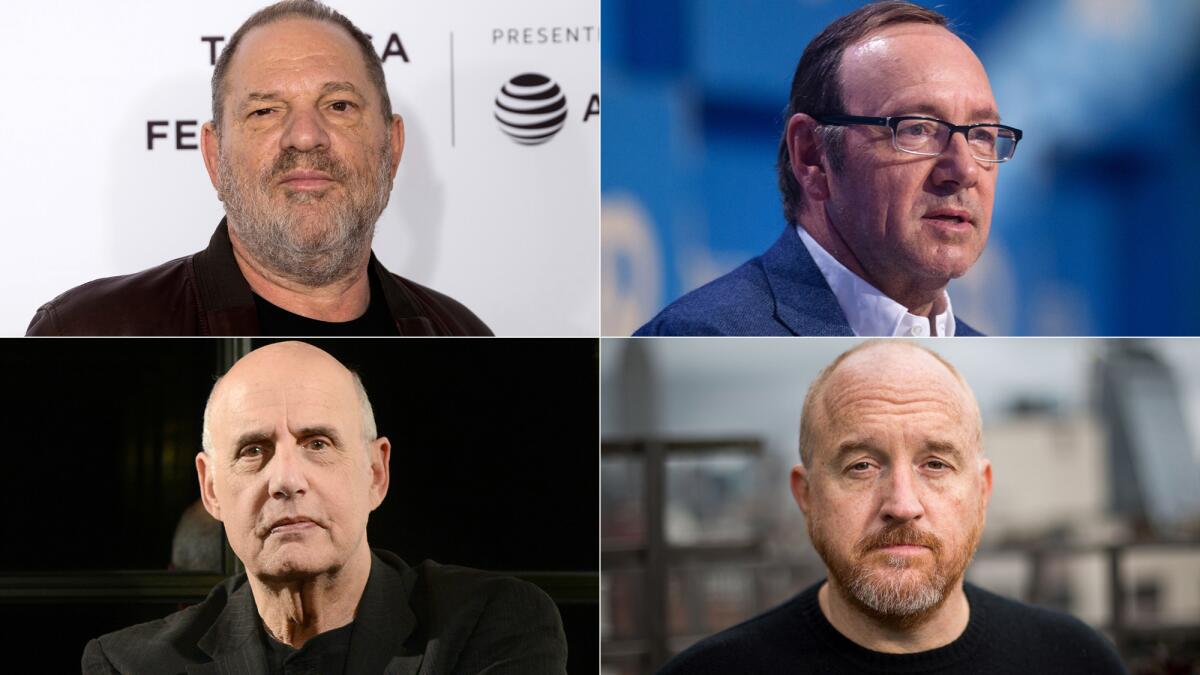Can we pretend an artistâs conduct doesnât matter in post-Harvey Weinstein Hollywood?

In light of the widespread accusations of sexual misconduct sweeping through Hollywood and beyond, Times film critic Justin Chang and television critic Lorraine Ali discuss how this seismic shift has changed the way they view movies and TV shows.
JUSTIN CHANG: Like most critics, Lorraine, you and I spend more time consuming and processing screen entertainment than passing judgment on the morality of the people who created it. Itâs the purer, more sophisticated approach, we like to tell ourselves. It also happens to be the easier one. And if one thing has become clear over the past two months, in the wake of a crisis that began with Harvey Weinstein and has now engulfed the entire industry, itâs that pretending an artistâs conduct doesnât matter can be as shortsighted as pretending that itâs the only thing that matters.
The Louis C.K. news, in particular, has inspired more than a few critics to write about the futility of trying to separate the art from the artist. Having seen C.K.âs unreleased comedy, âI Love You, Daddy,â a day before it was dropped by its distributor, I can sympathize. What once might have felt like a slyly confessional work now feels like a coy, manipulative dodge. Another way to put it is that the movie feels booby-trapped â not unlike several other beloved films and TV shows we could name that canât help but play differently now than they did before.
LORRAINE ALI: Thatâs true. Think about any given episode of âMad Menâ now: The multiple scenes of executives chasing their assistants and secretaries around the office was entertaining when the show debuted in 2007 because we let ourselves believe they represented a bygone era â the American workplace before the womenâs liberation movement and the sexual revolution. It was us before, but now weâre better! Sure it was disturbing to watch, but there was a comfort in seeing how far weâve come. Now, however, watching those episodes, itâs like watching todayâs headlines re-enacted, but with midcentury stylings.
CHANG: Another reason âMad Menâ might play differently now, of course, is that Matthew Weiner has been accused of sexual harassment by a former writer and assistant on the show. Weiner has denied the accusation and even held up âMad Menâ itself as a defense â as if the creator of a drama that brilliantly illuminates the exploitation of women in the workplace couldnât possibly be guilty of such exploitation himself. Whatever Weiner may or may not have done, the truth is that creative people often do fall short of the values articulated in their work, and the art itself can become a revealing window into that struggle.
Itâs different, and harder, for actors. Whatever issues we may have with a writer or director, weâre usually not staring at him (or her) for an hour or two. But actors have no place to hide. Great performances can make us forget who weâre looking at, but only up to a point. Actors cannot simply shed their personal histories on-screen, and as weâve seen from Ridley Scottâs extraordinary 11th-hour decision to replace Kevin Spacey with Christopher Plummer in âAll the Money in the World,â they cannot simply bury them under makeup and prosthetics, either.

Kevin Spacey, Michelle Williams and Mark Wahlberg in the trailer for Ridley Scottâs âAll the Money in the World.â
ALI: What do we even do with a great show like âHouse of Cardsâ at this point? It was a spot-on series about the sleazy underbelly of Capitol Hill, with Spacey as a politician who stops at nothing to get what he wants. Now with the wave of accusations of sexual misconduct against Spacey, aspects of that fictitious character donât seem all that fictitious ⌠or entertaining. Then thereâs âTransparent,â which starred Jeffrey Tambor as a trans woman. His performance was so consistently phenomenal, but now how will that character â who identifies as a woman â stand up to real-life accusations that Tambor was harassing women on set?
CHANG: Spacey is a peculiar case, in part because his very on-screen presence can be alienating by design. Even his role choices suggest heâs an actor who likes to lean into his own creepiness. Knowing what we now know, who wouldnât shudder in revulsion at the final moments of âAmerican Beauty,â in which Spaceyâs middle-aged suburban dad is (wrongly) suspected of seducing a teenage boy and then murdered by a closeted neighbor?
But for the most part, he isnât an actor who cries out for the audienceâs love, and that makes a difference. I think Iâd sooner watch Spacey do his slippery villainy thing in âHouse of Cardsâ than, say, watch Bill Cosby bask in the audienceâs admiration as Cliff Huxtable.
ALI: Oh right, Cosby. Canât have this kind of conversation without him. Networks have scrubbed his reruns from rotation like he never existed outside the horrifying charges. But Iâm still really grappling with this one because of his other legacy, which is a positive one. Cosby challenged traditional black stereotypes on TV, seized creative control in an all-white industry.
Television was segregated and he played a huge role in changing that dynamic. We of course still have a long way to go, but the bitter truth is that even contemporary shows made by and starring women of color â âInsecure,â âScandalâ and âOrange Is the New Blackâ â would not exist without Cosby breaking through color barriers decades ago. Thereâs no forgiving the damage heâs done, but do we forget how crucial he was in demystifying characters of color on TV, and challenging the idea that whites would never watch a âblackâ show?
CHANG: Where Cosbyâs legacy is concerned, if progress is intersectional, then so, alas, is wrongdoing. We can be grateful for the doors he opened and still be ruthlessly honest about the damage he did, including to his own work. âThe Cosby Showâ was a landmark series and should still be acknowledged as such, even if the landmark has revealed some serious cracks and fissures. We can be proud of the doors it opened for talented people, even if we can no longer be proud of Bill Cosby.
I think âCBS This Morningâ host Gayle King said it best in her beautifully honest reckoning with the accusations against co-host Charlie Rose, in which she pointed out the difficulty â yet the necessity â of realizing that oneâs friends and colleagues are capable of doing monstrous things. âYou can hold two ideas in your head at the same time,â she said. She speaks for all of us, I think. This kind of re-estimation and reappraisal is painful, but itâs necessary, maybe even vital.
Pretending an artistâs conduct doesnât matter can be as shortsighted as pretending that itâs the only thing that matters.
— Justin Change, Times film critic
ALI: I agree, and also think that reappraisal should include backing off the blanket condemnation of the accused and considering each new case of abhorrent behavior separately (canât believe I just wrote that line). Seriously, though, [Sen. Al] Franken is a perfect example: He admittedly groped a woman and forcibly kissed her. Itâs inexcusable and wrong.
But it appears, as of right now, to be an isolated instance. Do we assess him the same way we do accused serial predators like Foxâs Roger Ailes or Harvey Weinstein? I worry that this new and very necessary outing of predators is moving at such a furious pace that weâre not looking at the gradations of severity in these cases. The concern isnât so much about Frankenâs career, but the media lumping him in with men accused of serial rape, sexual assault and pedophilia. Itâs a reactionary approach that could result in dangerous crimes being downplayed as indiscretions, therefore fewer victims coming forward for fear that they wonât be believed.
CHANG: What concerns me about the industryâs response so far is the tendency toward wholesale erasure, whether by dropping problematic projects or selectively re-editing certain works, as PBS is doing by cutting Franken out of its upcoming David Letterman tribute. It will be fascinating to see how âTransparentâ and âHouse of Cardsâ move forward without their suddenly toxic leads.
ALI: And does erasing them from those spots also mean sweeping the issue under the proverbial carpet?
CHANG: Iâm a bit bothered by what all these mass purges say about the industryâs faith in the audienceâs intelligence. While Iâm awed by Ridley Scottâs sheer chutzpah in purging any trace of Spacey from his movie, I have to admit thereâs something about the whole crazy idea that gives me pause on a symbolic level â as if Hollywood could simply throw a ton of money at the problem and digitally airbrush its sins away.
Similarly, while I completely understand the business reasons for not releasing âI Love You, Daddy,â part of me wishes the movie were out there and available for the publicâs scrutiny. Itâs a prickly, fascinating work that doesnât reveal everything about its maker, but it sure as hell reveals something. For that matter, I also wish that HBO hadnât dumped its past C.K. specials from its On Demand service, as if they were suddenly untouchable garbage. Why do distributors and networks infantilize their audiences, as if we werenât capable of handling messiness and moral complexity?
ALI: Scripted television is reflecting the moment in series like Huluâs âThe Handmaidâs Taleâ and âHarlotsâ â even though they were written and shot well before the current tsunami of accusations, something must have been in the air. Central to the themes of these shows is the rise of women who were diminished, subjugated and abused. Now even the traumatized female characters on âGame of Thronesâ are wrestling power from the men, and weâre rooting for them. OK, maybe not Cersei Lannister, but you get what Iâm saying, right?
CHANG: I, for one, have always rooted for Cersei! And also Lena Headey, the brilliant actress who plays her, who went public with her own Weinstein harassment story weeks ago. Down with the patriarchy, in Westeros and Hollywood.
ALI: Yet both those realms have been forced to reckon with the problem.
CHANG: Iâve been impressed to some extent by Hollywoodâs progress, or at least its frantic, self-congratulatory show of progress. Whatever the motives behind it, the speed and scale of the industryâs sudden zero-tolerance policy toward sexual misconduct, its eagerness to distance itself from the offenders in its midst, suggests that a significant paradigm shift is in the works.
ALI: As a woman who has covered entertainment and the media for most of my career, Iâm not at all surprised by what accusers are alleging happened in the presence of influential men. Itâs a hazard we all face as women in the workplace. What has been remarkable, however, is that the public and media are finally taking it seriously, and now the hits keep coming. I never imagined weâd be in this place today. Itâs disturbing on one hand, but a huge mark of progress on the other.
More to Read
Only good movies
Get the Indie Focus newsletter, Mark Olsen's weekly guide to the world of cinema.
You may occasionally receive promotional content from the Los Angeles Times.












